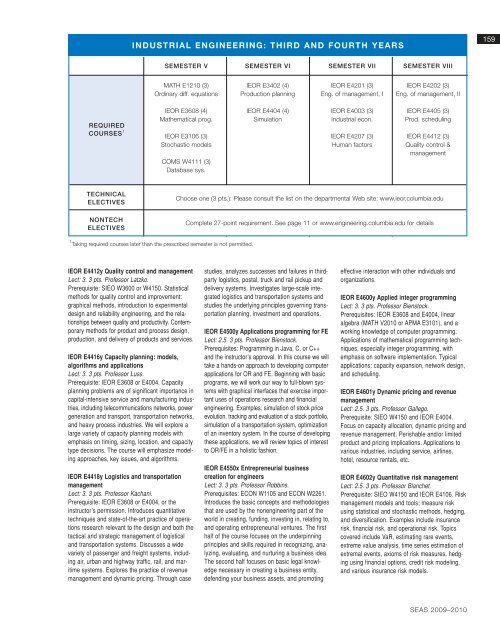2009-2010 Bulletin â PDF - SEAS Bulletin - Columbia University
2009-2010 Bulletin â PDF - SEAS Bulletin - Columbia University
2009-2010 Bulletin â PDF - SEAS Bulletin - Columbia University
You also want an ePaper? Increase the reach of your titles
YUMPU automatically turns print PDFs into web optimized ePapers that Google loves.
INDUSTRIAL ENGINEERING: THIRD AND FOURTH YEARS<br />
159<br />
SEMESTER V SEMESTER VI SEMESTER VII SEMESTER VIII<br />
MATH E1210 (3) IEOR E3402 (4) IEOR E4201 (3) IEOR E4202 (3)<br />
Ordinary diff. equations Production planning Eng. of management, I Eng. of management, II<br />
REQUIRED<br />
COURSES 1<br />
IEOR E3608 (4) IEOR E4404 (4) IEOR E4003 (3) IEOR E4405 (3)<br />
Mathematical prog. Simulation Industrial econ. Prod. scheduling<br />
IEOR E3106 (3) IEOR E4207 (3) IEOR E4412 (3)<br />
Stochastic models Human factors Quality control &<br />
management<br />
COMS W4111 (3)<br />
Database sys.<br />
TECHNICAL<br />
ELECTIVES<br />
Choose one (3 pts.): Please consult the list on the departmental Web site: www.ieor.columbia.edu<br />
NONTECH<br />
ELECTIVES<br />
Complete 27-point requirement. See page 11 or www.engineering.columbia.edu for details<br />
1 Taking required courses later than the prescribed semester is not permitted.<br />
IEOR E4412y Quality control and management<br />
Lect: 3. 3 pts. Professor Latzko.<br />
Prerequisite: SIEO W3600 or W4150. Statistical<br />
methods for quality control and improvement:<br />
graphical methods, introduction to experimental<br />
design and reliability engineering, and the relationships<br />
between quality and productivity. Contemporary<br />
methods for product and process design,<br />
production, and delivery of products and services.<br />
IEOR E4416y Capacity planning: models,<br />
algorithms and applications<br />
Lect: 3. 3 pts. Professor Luss.<br />
Prerequisite: IEOR E3608 or E4004. Capacity<br />
planning problems are of significant importance in<br />
capital-intensive service and manufacturing industries,<br />
including telecommunications networks, power<br />
generation and transport, transportation networks,<br />
and heavy process industries. We will explore a<br />
large variety of capacity planning models with<br />
emphasis on timing, sizing, location, and capacity<br />
type decisions. The course will emphasize modeling<br />
approaches, key issues, and algorithms.<br />
IEOR E4418y Logistics and transportation<br />
management<br />
Lect: 3. 3 pts. Professor Kachani.<br />
Prerequisite: IEOR E3608 or E4004, or the<br />
instructor’s permission. Introduces quantitative<br />
techniques and state-of-the-art practice of operations<br />
research relevant to the design and both the<br />
tactical and strategic management of logistical<br />
and transportation systems. Discusses a wide<br />
variety of passenger and freight systems, including<br />
air, urban and highway traffic, rail, and maritime<br />
systems. Explores the practice of revenue<br />
management and dynamic pricing. Through case<br />
studies, analyzes successes and failures in thirdparty<br />
logistics, postal, truck and rail pickup and<br />
delivery systems. Investigates large-scale integrated<br />
logistics and transportation systems and<br />
studies the underlying principles governing transportation<br />
planning, investment and operations.<br />
IEOR E4500y Applications programming for FE<br />
Lect: 2.5. 3 pts. Professor Bienstock.<br />
Prerequisites: Programming in Java, C, or C++<br />
and the instructor’s approval. In this course we will<br />
take a hands-on approach to developing computer<br />
applications for OR and FE. Beginning with basic<br />
programs, we will work our way to full-blown systems<br />
with graphical interfaces that exercise important<br />
uses of operations research and financial<br />
engineering. Examples: simulation of stock price<br />
evolution, tracking and evaluation of a stock portfolio,<br />
simulation of a transportation system, optimization<br />
of an inventory system. In the course of developing<br />
these applications, we will review topics of interest<br />
to OR/FE in a holistic fashion.<br />
IEOR E4550x Entrepreneurial business<br />
creation for engineers<br />
Lect: 3. 3 pts. Professor Robbins.<br />
Prerequisites: ECON W1105 and ECON W2261.<br />
Introduces the basic concepts and methodologies<br />
that are used by the nonengineering part of the<br />
world in creating, funding, investing in, relating to,<br />
and operating entrepreneurial ventures. The first<br />
half of the course focuses on the underpinning<br />
principles and skills required in recognizing, analyzing,<br />
evaluating, and nurturing a business idea.<br />
The second half focuses on basic legal knowledge<br />
necessary in creating a business entity,<br />
defending your business assets, and promoting<br />
effective interaction with other individuals and<br />
organizations.<br />
IEOR E4600y Applied integer programming<br />
Lect: 3. 3 pts. Professor Bienstock.<br />
Prerequisites: IEOR E3608 and E4004, linear<br />
algebra (MATH V<strong>2010</strong> or APMA E3101), and a<br />
working knowledge of computer programming.<br />
Applications of mathematical programming techniques,<br />
especially integer programming, with<br />
emphasis on software implementation. Typical<br />
applications: capacity expansion, network design,<br />
and scheduling.<br />
IEOR E4601y Dynamic pricing and revenue<br />
management<br />
Lect: 2.5. 3 pts. Professor Gallego.<br />
Prerequisite: SIEO W4150 and IEOR E4004.<br />
Focus on capacity allocation, dynamic pricing and<br />
revenue management. Perishable and/or limited<br />
product and pricing implications. Applications to<br />
various industries, including service, airlines,<br />
hotel, resource rentals, etc.<br />
IEOR E4602y Quantitative risk management<br />
Lect: 2.5. 3 pts. Professor Blanchet.<br />
Prerequisite: SIEO W4150 and IEOR E4106. Risk<br />
management models and tools; measure risk<br />
using statistical and stochastic methods, hedging,<br />
and diversification. Examples include insurance<br />
risk, financial risk, and operational risk. Topics<br />
covered include VaR, estimating rare events,<br />
extreme value analysis, time series estimation of<br />
extremal events, axioms of risk measures, hedging<br />
using financial options, credit risk modeling,<br />
and various insurance risk models.<br />
<strong>SEAS</strong> <strong>2009</strong>–<strong>2010</strong>







